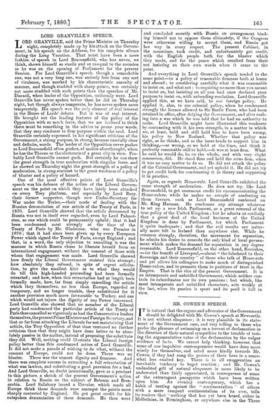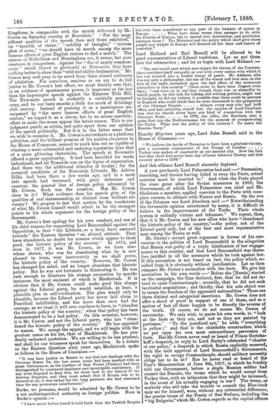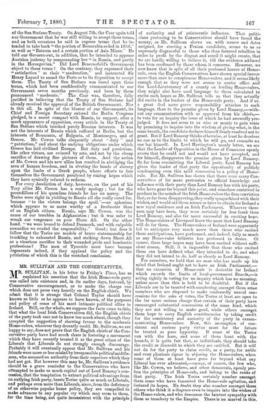MR. COWEN'S SPEECH.
IT is natural that the organs and advocates of the Government should be delighted with Mr. Cowen's speech at Newcastle. It is not without eloquence ; it is very plausible in its state- ment of the Government case, and very telling to those who prefer the pleasure of swimming on a torrent of declamation in the direction of their natural sympathies to the trouble of test- ing the argumentative value of the declamation by the vulgar evidence of facts. We cannot help thinking, however, that some of our impulsive contemporaries would have done more wisely for themselves, and acted more kindly towards Mr. Cowen, if they had sung the praises of their hero in a some- what less exalted key. There is in all exaggeration an inevitable tendency to beget reaction ; and Mr. Cowen's undoubted gift of natural eloquence is more likely to be underrated than fairly appreciated, in consequence of some of the extravagant panegyrics which have been written upon him. An evening contemporary, which has a habit of ranting against the " sentimentalism" of others with a more rampant sentimentalism of its own, tells its readers that "nothing that has yet been heard, either in Midlothian, in Birmingham, or anywhere else in the Three Kingdoms, is comparable with the speech delivered by Mr. Cowen on Saturday evening at Newcastle." "For the mag- nificent qualities of the speech then and there exhibited," its "breadth of vision," "nobility of thought," "intense glow of scorn," "we should have to search among the more famous efforts of great English orators to find a match." The orators of Midlothian and Birmingham are, it seems, but poor creatures in comparison. Against the "fire of manly common- sense" which blazed so gloriously at Newcastle, they have nothing better to show than "wild and shifty declamation." Mr. Cowen may well pray to be saved from these absurd outbursts of adulation. For ourselves, anxious as we are to do full justice to Mr. Cowen's last effort, we must frankly own that, as an evidence of spontaneous power, it impresses us far less than his impromptu speech against the Empress Title Bill. The Newcastle speech is evidently a carefully prepared essay, and to our taste smacks a little too much of debating- club oratory. Instead of praising it as a masterpiece un- surpaised by "the more famous efforts of great English orators," we regard it as a clever, but by no means masterly, effort to make the worse appear the better reason. This is our judgment purely as critics, and quite apart from our opinion of the speech politically. But it is in the latter sense that we wish to examine it. Mr. Cowen's antecedents as a platform politician, and the brillant promise of his maiden eloquence in the House of Commons, seemed to mark him out as capable of winning a more substantial and enduring reputation than that of a mere glittering rhetorician. The speech at Newcastle offered a great opportunity. It had been heralded for weeks beforehand, and all Tyneside was on the tiptoe of expectation. And there was the additional stimulus of rivalry ; for the accepted candidate of the Newcastle Liberals, Mr. Ashton Mike, had been there a few weeks ago, and in a most able speech had traversed, with great deference and courtesy, the general line of foreign policy advocated by Mr. Cowen. Such was the occasion. Has Mr. Cowen risen to it ? What evidence does his speech give of the qualities of real statesmanship, as distinct from brilliant ad- vocacy ? We propose to test that matter, by the touchstone of what Mr. Cowen himself would admit to be the strongest points in ' his whole argument for the foreign policy of the Government.
Mr. Cowen's first apology for his own conduct, and one of his chief reasons for supporting Lord Beaconsfield against the Opposition, is, that "the Liberals, as a body, have assumed towards" the Eastern Question "an altered attitude. They have abandoned, no doubt for reasons which appear to them good, the historic policy of the country." In 1874, and even in 1877, it was Mr. Cowen, as we have else- where shown, who was for abandoning what he is now pleased to term, very inaccurately as we shall prove, the historic policy of the country. However, Mr. Cowen has changed his mind, and no longer abandons that historic policy. But he was not fortunate in illustrating it. He was rash enough to illustrate his strange accusation by specific instances, the most eminent of which is Mackintosh. It is obvious that if Mr. Cowen could make good this charge against the Liberal party, he would establish, at least, a plausible plea in self-vindication. The plea would only be plausible, because the Liberal party has never laid claim to Pontifical infallibility, and has more than once had the courage, as we trust it will ever continue to have, to "abandon the historic policy of the country," when that policy has been demonstrated to be a bad policy. On this occasion, however, it is Mr. Cowen, and not the Liberal party, who has "aban- doned the historic policy of the country." He has appealed to names. We accept the appeal, and we will begin with the greatest name on his list, that of Mackintosh. He has pru- dently eschewed quotation. We are willing to be less prudent, and shall let our witnesses speak for themselves. In a debate on the Eastern Question sixty years ago, Mackintosh spoke as follows in the House of Commons :— "It was bare justice to Russia to say that her dealings with the Ottoman Power for the last seven years had been marked with as great forbearance, as the conduct of that Power (Turkey) had been distinguished by continued insolence and incorrigible contumacy. If any were disposed to deny this, let them look to the history of the Servian Deputies, and they must admit that if Russia was to be blamed at all, it was rather for the long patience she had exercised than for any premature interference."
Burke, we presume, would be admitted by Mr. Cowen to be a not undistinguished authority on foreign politics. Here is Burke's opinion :— " I have never before heard it held forth that the Turkish Empire
has ever been considered as any part of the balance of power in
Europe What have those worse than savages to do with the Powers of Europe, but to spread war, destruction, and pestilence amongst them ? The Ministers and the policy which shall give those people any weight in Europe will deserve all the bans and curses of posterity."
Lord Holland and Earl Russell will be allowed to be good representatives of Liberal traditions. Let us put them into the witness-box ; and let us begin with Lord Holland :— " The anti-social race which now enjoys the throne of the Constan- tines considers itself naturally at war with every nation with which it has not entered into a formal treaty of peace. Mr. Addison, who was not only a philosopher, but one of the wisest and best men on the face of the earth, remarked upon the bad effect of the numerous journalists in this country" [there seem to have been Jingoes even then], "and went on to say that though there was no absurdity to which people, by this itch for talking and writing politics, might not be brought, he did not believe it possible that there could be persons in England who could think that we were interested in the prosperity
of the Ottoman Empire Almost every man who had held office, and had authority, stated that the opinion of Lord Chatham was that we should never have any kind of connection with the
Ottoman Porte In 1772, our allies, the Russians, sent a great fleet into the Mediterranean for the purpose of overpowering the Turks. What was the policy of this country ? To assist the Russian Navy."
Exactly fifty-two years ago, Lord John Russell said in the House of Commons :— " We believe the battle of Navarino to have been a glorious victory,
and a necessary consequence of the Treaty of London Turkey was spoken of constantly as our ancient ally. Now the fact was that there had never been any alliance between Turkey and this country prior to 1799."
And this affiance Lord Russell sincerely deplored.
A year previously Lord Palmerston had said :—" Persuasion, reasoning, and threats having failed to sway the Porte, actual coercion must be resorted to." And when the Porte played the same game after the Syrian massacres in 1860, the Government, of which Lord Palmerston was chief and Mr. Gladstone a member, applied coercion to the Porte with com- plete success, in alliance with France and Russia. On the eve of the Crimean war Lord Aberdeen said :—" Notwithstanding the favourable opinion entertained by many, it is difficult to believe in the improvement of the Turks. Their whole system is radically vicious and inhuman." We repeat, then, that it is Mr. Cowen and his new allies who have "abandoned the historic policy of the country,"—the policy, not of the Liberal party only, but of the best and most representative men among the Tories as well.
Mr. Cowen's second great argument in favour of his con. version to the politics of Lord Beaconsfield is the allegation that Russia was guilty of a triple falsification of her engage- ments to this country, and that Lord Beaconsfield was there. fore justified in all the measures which he took against her: If this accusation is not based on fact, the policy which re- sulted from it is obviously without justification. Let us then compare Mr. Cowen's accusation with the facts. We give his accusation in his own words :—"Before she [Russia] started on the campaign, the Czar declared, first, that he did not in- tend to enter Constantinople ; secondly, that he did not seek territorial acquisitions ; and thirdly, that his sole object was to insure the freedom of the oppressed nationalities." These are three distinct and categorical assertions. Mr. Cowen does not offer a shred of proof in support of one of them, and as a matter of fact all three happen to be directly the reverse of the truth. Of course, we do not accuse Mr. Cowen of unveracity. We only wish, to quote his own words, to "look at the facts as they are, and not as they are painted by partisans." "To the jaundiced eye," he adds, "everything is yellow ;" and that is the charitable construction which we put upon his own most extraordinary perversion of facts. Has Mr. Cowen never read or heard of Prince Gorteha- koff's despatch, in reply to Lord Derby's celebrated "charter of our policy," a despatch in which Russia explicitly reserved, with the tacit approval of Lord Beaconsfield's Government, the right to occupy Constantinople, should military necessity oblige her to do so t Has he never read or heard of the Czar's Memorandum of June 8th, 1877, in which he frankly told our Government, before a single Russian soldier had crossed the Danube, the terms which he would accept from Turkey then, with an intimation that they might be increased, in the event of his actually engaging in war? The terms, as anybody who will take the trouble to consult the Blue-book may see for himself, were, without any substantial difference, the precise terms of the Treaty of San Stefano, including the "big Bulgaria," which Mr. Cowen regards as the capital offence of the San Stefano Treaty. On August 7th, the Czar again told our Government that he was still willing to accept these terms, and on both occasions he said in express terms that he in- tended to take back "the portion of Bessarabia ceded in 1856," as well as " Batoum and a certain portion of Asia Minor." He told our Government, in addition, that he intended to appease Austrian jealousy by compensating her "in Bosnia, and partly in the Herzegovina." Did Lord Beaconsfield's Government object to these terms ? On the contrary, they expressed their " satisfaction " at their "moderation," and instructed Sir Henry Layard to sound the Porte as to its disposition to accept them. The Treaty of San Stefano was based upon these terms, which had been confidentially communicated to our Government seven months previously, and been by them pronounced "moderate." The Czar was, therefore, fully justified in believing that the Treaty of San Stefano had already received the approval of the British Government. Nor is this all. In spite of the bluster of our Government, its Chief and Foreign Secretary entered the Berlin Congress pledged, in a secret compact with Russia to support, after a mock appearance of opposition, every article in the Treaty of San Stefano which touched purely Russian interests. It was not the interests of Russia which suffered at Berlin, but the interests of Roumania, of Bulgaria, of Montenegro, and of Greece. Mr. Cowen talks eloquently about "duty " and "patriotism," and about the undying obligations under which Greece has laid civilised Europe. But duty and patriotism, like other virtues, are evinced by acts, and not by the cheap sacrifice of drawing fine pictures of them. And the action of Mr. Cowen and his new allies has resulted in abridging the area of human freedom, and in riveting the bonds of slavery upon the limbs of a Greek people, whose efforts to free themselves the Government paralysed by raising hopes which they have cynically refused to redeem.
For every dereliction of duty, however, on the part of his Tory allies Mr. Cowen has a ready apology ; but for the peccadilloes of his quondam friends he has no mercy. The Tories were right in yielding to Russia all she really cared for, because "to the victors belongs the spoil,"—an aphorism which appears to us more worthy of a freebooter than of an English citizen. Russia, says Mr. Cowen, was the cause of our troubles in Afghanistan ; but it was safer to wreak our vengeance on poor Shere Ali. On the other hand, "we were bound to defend Denmark, and with culpable cowardice we evaded the responsibility." Good ; but does it follow that the Tories are models of brave statesmanship for truckling to exhausted Russia, and striking down Shere Ali as a vicarious sacrifice to their wounded pride and bombastic professions? The men of Tyneside must have become degenerate indeed, if they applaud the policy and the patriotism of which this is the wretched conclusion.




































 Previous page
Previous page